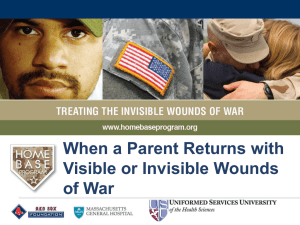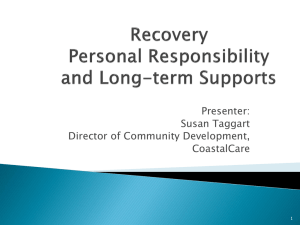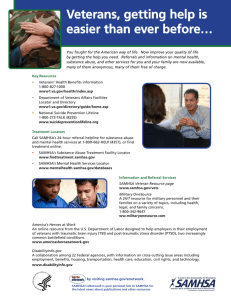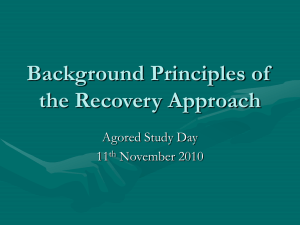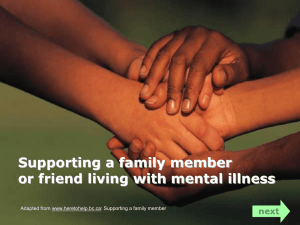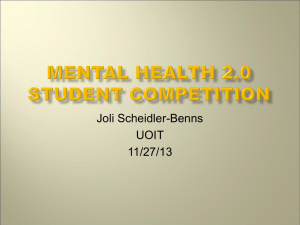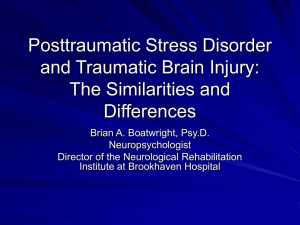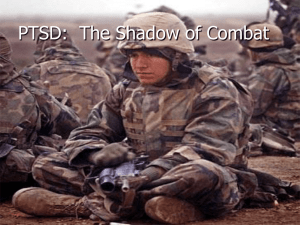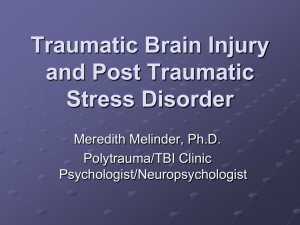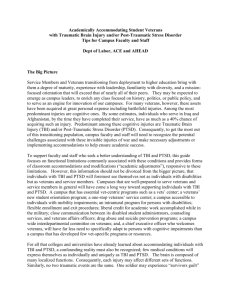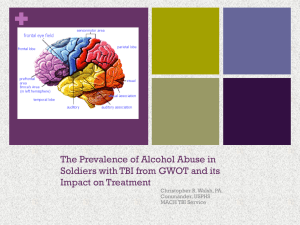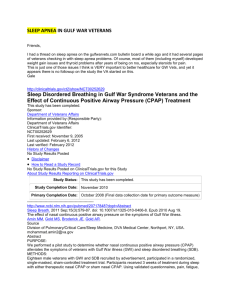Inclusive Member Experiences for Individuals with Mental Health
advertisement
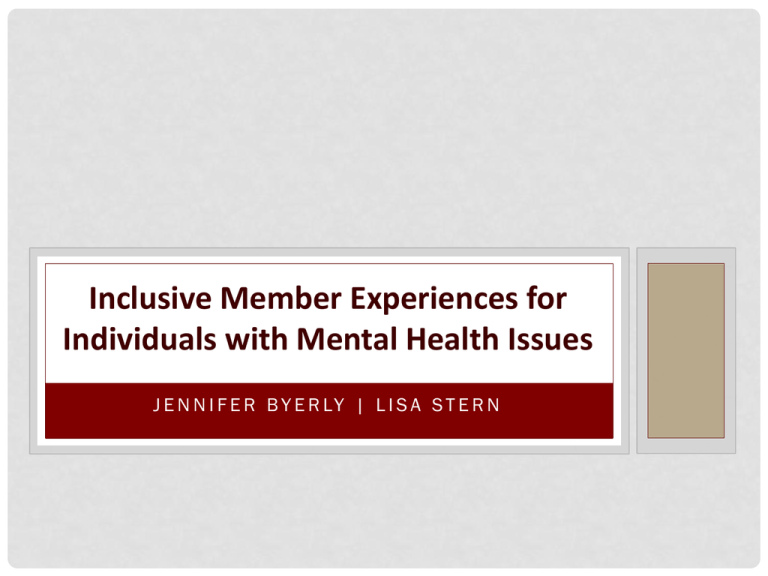
Inclusive Member Experiences for Individuals with Mental Health Issues J E N N I F E R B Y E R LY | L I S A S T E R N Objectives • Present (and dispel) the myths commonly associated with mental health issues • Learn how to create inclusive and welcoming experiences for all members • Gain a better understanding of Veterans living with post-traumatic stress disorder (PTSD) and/or traumatic brain injury (TBI) and how service can be an important part of their recovery and reintegration Myths & Facts Mental illness won’t affect me • Mental illness is surprisingly common; they affect almost every family in America. Mental illness does not discriminate – it can affect anyone. • In a given year approximately 25% of adults are diagnosable for one or more disorders (approx. 50% over a lifetime). • While mental illness is widespread in the population, the main burden of the disorder is concentrated among a much smaller proportion (about 6 percent, or 1 in 17) who suffer from a seriously debilitating mental illness. People with mental illness are more prone to violence and unpredictability • In reality, the vast majority of people who have mental health needs are no more violent than anyone else. You probably know someone with a mental illness and don't even realize it. Mental illness is usually brought on by a weakness of character • Mental illness is a product of the interaction of biological, psychological, and social factors. Research has shown genetic and biological factors are associated with schizophrenia, depression, and alcoholism. • Social influences, such as loss of a loved one or a job, can also contribute to the development of various disorders. People with mental illnesses cannot tolerate the stress of holding down a job • All jobs are stressful to some extent. Productivity is maximized when there is a good match between the employer (needs and working conditions/environment) and the skill set and interests of the employee – NOT whether the individual has mental health needs. • Employers who have hired people with mental illness report good attendance and punctuality, as well as motivation, quality of work, and job tenure on par with or greater than other employees. • Studies by the National Institute of Mental Health (NIMH) and the National Alliance for the Mentally Ill (NAMI) show that there are no differences in productivity when people with mental illnesses are compared to other employees. Once people develop a mental illness, they never recover • Studies show that most people with mental illnesses get better, and many recover completely. • Recovery refers to the process in which people are able to live, work, learn, and participate fully in their communities. • For some individuals, recovery is the ability to live a fulfilling and productive life. For others, recovery implies the reduction or complete remission of symptoms. • Science has shown that having hope plays an integral role in an individual's recovery. I can't do anything for someone with mental health needs • Start with actions and vocabulary & nurture an environment that builds on people's strengths and promotes good mental health. • Avoid labeling people with words like "crazy," "wacko," "loony," or by their diagnosis (instead of saying someone is a "schizophrenic" say "a person with schizophrenia”). • Learn the facts about mental health and share them with others, especially if you hear something that is untrue. • Treat people with mental illnesses with respect and dignity, as you would anybody else. • Respect the rights of people with mental illness and don't discriminate against them when it comes to housing, employment, or education. Full Participant Inclusion In National Service Organizations/Initiatives J E N N I F E R B Y E R LY Promising Practice Everyone NEEDS, WANTS and DESERVES to participate fully in all aspects of their community. Jennifer Wayne Byerly • AmeriCorps Alumni • American Red Cross, Disaster Action Team Member (DAT), Big Rivers Chapter • Medical Reserve Corps • Community Emergency Response Team (CERT) • One of the first local American Red Cross members to selfidentify as a person with a disability • First person with a mental health-related disability to serve as consumer rep on the IN Dist. 10 Mental Health Response Team • Trips, Inc. Chaperone for travelers who happen to have access & functional needs. Bio • Parents, Northern Virginia days • Our Hoosier Homestead farm • SSDI, Ticket to Work Program, Indiana Vocational Rehabilitation Consumer • Currently a Certified Recovery Specialist at the Rockport Engagement Center, and practicing WRAP (Wellness Recovery Action Program) Rockport Engagement Center (REC) • Assist citizens 18 & over who struggle with mental health diagnoses to live, work, learn, and participate fully in the community • Increase consumer awareness and access to existing natural support systems, including and IN (CRS) • Emergency preparedness planning, policy making/advocacy and servant leadership is taught/encouraged • Funded by grant from Indiana Dept. of Mental Health and Addiction • We empower people out of isolation and into wellness and recovery Jennifer Byerly Attended The 41st National Council on Mental Health and Addictions Conference San Diego, CA | May 2-4, 2011 • The experience of attending profoundly affected me • Because of the opening remarks made by past U.S. President Bill Clinton, the wisdom shared by peer speaker Meghan Caughey, and Journalist/Author Pete Earley’s heart felt ideas • New Freedom Commission on Mental Health Vision Statement What I Know for Sure… • Recovery happens and treatment works • All deserve to participate fully • The use of peers to offer support at clinics, shelters, and other venues only make efforts more effective • Practice daily: WRAP, servant leadership, policy making, advocacy, kindness • Eliminate the illusion that only an elite group makes the decisions: mandate consumers must sit on your advisory boards • A CRS supports the recovery process in a way that enhances the clinicians efforts (I augment the work of the psychologist, case manager, social worker, etc.) A New Face of Diversity: Veterans and Returning Service Members Veterans and Transitioning Service Members • Tend to possess an overall skill set that shows tremendous benefit the civilian workforce: • • • • • accelerated learning curve respect and honor - dedication and focus loyalty and integrity (gets the job done) works brilliantly under pressure duty, selfless service, personal courage, and MORE • Experience difficulty translating their military experience into civilian language and terminology • Often unsure about exposing their military history due to societal stigma Injured Returning Service Members • More than 36,000 service members return with significant physical injuries. • Signature injuries of the current overseas conflicts are unseen • Nearly one in four report they might have experienced a TBI, usually as the result of a roadside bomb. The Pentagon estimates roughly 220,000 brain injuries since the wars began. • Nearly one in five veterans of the Iraq and Afghanistan wars is currently living with depression or stress disorder. Stigma • When the Society for Human Resource Management surveyed its members (June 2010), 46% said they believed posttraumatic stress and other mental health issues posed a hiring challenge. Just 22% said the same about combatrelated physical disabilities. • Although media attention has helped make the diagnosis and treatment of PTSD and traumatic brain injury a government priority, veterans say it has also contributed to the stigma associated with these wounds. • "They hear so many stories on the news — this soldier got back from Iraq and killed his wife — which makes people a little reluctant to hire you." Potential Impact of a Brain Injury Symptoms that result from TBI are known as post-concussion syndrome (PCS). Few people will have all of the symptoms, but even one or two of the symptoms can be unpleasant. PHYSICAL • • • • • • Headache Feeling dizzy Being tired Trouble sleeping Vision problems Bothered by noise and light COGNITIVE (mental) • • • • • Memory problems Trouble staying focused Poor judgment & impulsivity Being slowed down Trouble putting thoughts into words EMOTIONAL (feelings) • • • • Depression Anger outbursts/quick to anger Anxiety (fear, worry, or feeling nervous) Personality changes Most people with a mTBI will be back to normal by 3 months without any special treatment. Even patients with moderate or severe TBI can make remarkable recoveries. Examples of Accommodations for TBI Flexible scheduling, allow longer or more frequent work breaks Provide additional time to learn new responsibilities Allow for use of job coaches Provide for job sharing opportunities Encourage the use daily ‘to-do’ lists and check items off as they are completed Provide a special calendar to mark meetings and deadlines Assign a mentor to assist in determining goals and provide daily guidance Provide written as well as verbal instructions PTSD PTSD is a prolonged reaction to stress. The recollection of a memory increases the stress for the moment and may cause a temporarily increased response in the form of signs and symptoms. Sensory Input Triggered Memory Increased Response *Signs and symptoms are generally not always as exaggerated as what we see in the media. PTSD Signs Symptoms Stressors Signs and Symptoms Potential Stressors/Triggers • • • • • • • • • • An argument Seeing a news article that reminds you of your traumatic event Watching a movie or television show that reminds you of your traumatic event Seeing a car accident Certain smells The end of a relationship An anniversary Holidays A specific place Seeing someone who reminds you of a person connected to your traumatic event • • • • • • • • • • • • • • Anger Anxiety Grief Hyperalertness Irritability Sadness Memories Feeling lonely Feeling abandoned Frustration Feeling out of control Feeling vulnerable Racing heart beat Pain or Muscle tension Examples of Accommodations for PTSD Use a daily or weekly task list Reduce distractions in the work environment Allow the individual to play soothing music using a headset Divide large assignments into smaller goal-oriented tasks or steps Assign a supervisor, manager or mentor to answer questions Use stress management techniques to deal with frustration Allow telephone calls during work hours to doctors and others for needed support Allow for a flexible start time or end time, or work from home Allow time off for counseling and medical appointments Very Important! NOT all triggers are the same for each individual and more importantly do not always trigger a reaction in that individual. The injuries related to military service (physical, psychological health and cognitive) are “acquired injuries.” A Veteran may simply need time to figure out what his or her mind and body can do again. Every employee with a TBI or PTSD is an individual and therefore a strategy you try with one individual may not work with the next. You don’t need to have all of the answers! Trial and error is often the best practice…for both the Veteran and the employer. Workplace supports and accommodations create a welcoming and productive environment (for all employees). Given The Choice Given the choice between work and idleness, people will almost always choose work. Regardless of our station in life, the conditions of our bodies and minds, or the amount of money in our bank accounts, the need to work remains one of our strongest drives. Work is central to our lives, and as such, gives a large measure of structure to our days. Common sense tells us that we feel better about ourselves when we are working regularly. - Robert E. Drake, M.D., Ph.D. RESOURCES Job Accommodation Network (JAN) http://askjan.org National Resource Directory www.nrd.gov Contact information Jennifer Wayne Byerly Lisa Stern Indiana Certified peer Recovery Specialist (CRS) Rockport Engagement Center (REC) 319 South Fifth St., #5 Rockport, IN 47635 Ph: (812) 649-9948 itsme47635@yahoo.com Workforce and Diversity Consultant Stern Consulting, LLC Sandy Spring, MD 301.237.1660 (mobile) sternconsultingllc@gmail.com


